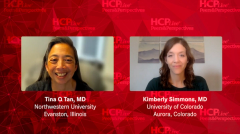
Emerging Treatments in T1D
What treatments are currently available, or what treatments are in development, to try to slow the progression of type 1 diabetes [T1D]?
Episodes in this series
Tina Q. Tan, MD: What treatments are currently available, or what treatments are in development, to try to slow the progression of type 1 diabetes [T1D]?
Kimberly Simmons, MD: Currently, there’s only 1 medication that has been approved, and that was approved on November 17, 2022, for delaying the onset of stage 3 type 1 diabetes. That drug is called teplizumab. That medication is a drug that is given via IV [intravenous therapy] infusion. The IV infusion takes about a half an hour, and it’s given for 14 days in a row. A TrialNet study that it was tested in showed that there was an average delay to the onset of type 1 diabetes of 3 years in people who received that medication. It’s exciting that we have something to offer patients, and it has opened the door. And that’s probably the most important thing, to add to that arsenal of medications over the next 5 to 10 years. There are other medications that are being tried within both industry and TrialNet initiatives to see if type 1 diabetes can be delayed. And maybe one day it can be prevented by figuring out the right way to administer all of these.
Tina Q. Tan, MD: How young can this medication be given?¼
Kimberly Simmons, MD: Eight years of age and older is what the current indications are. TrialNet is working on designing a study that would be for kids younger than that, but right now it would be prescribed to kids ages 8 and older.
Tina Q. Tan, MD: A question that people always ask is: Is this covered by insurance and by Medicaid?
Kimberly Simmons, MD: I think we have yet to determine what insurance coverage will look like. I’m hopeful that it will be covered, and Medicaid usually does a really great job in Colorado of coming on board with things that have great therapeutic potential. But that varies from state to state. We’ll have to see how that all plays out. And the other thing that’s important is, I’m speaking as a pediatrician, but the drug is approved for adults, too. So, I say 8 and older kids, but also adults that have ILA [lymphocyte activation] autoantibodies and dysglycemia.
Tina Q. Tan, MD: What are some other emerging therapies that are coming out or are just released for treating type 1 diabetes?
Kimberly Simmons, MD: When we’re talking in terms of immunotherapy, there hasn’t been anything submitted to the FDA as an example. A lot of the studies are just starting, so it will take time to enroll and to see what the clinical end points show and then submit to the FDA. I think probably in the next 10 years we’ll see some things. Antithymocyte globulin is a study that we’ll be starting in people who are in stage 2 type 1 diabetes through TrialNet. In the next few months, TrialNet will probably have people enrolled. A lot of the other studies are still in pretty small safety and efficacy trials.
Tina Q. Tan, MD: Can you talk a little bit about the clinical trials, if they’re even in humans now, for beta cell regeneration?
Kimberly Simmons, MD: That is an area of great interest, because if we can regenerate beta cells, then that makes these therapies that are being approved potentially useful for people that already have type 1 diabetes. I think it’s a very exciting area of research. It’s outside of my direct research expertise, but I do know that there’s been a lot of promise recently and that the people we have at our center working on beta cell regeneration have really provided a lot of hope compared to what we’ve seen in the past. We do know that the challenge really is still how do you get those cells to survive without having immunosuppressants on board. That’s something where there are a lot of different methods being looked at to try to make that happen. That’s another area where I think we’ll see some development in the next 5 to 10 years.
Tina Q. Tan, MD: What’s the role for stem cell transplantation in individuals that have severe type 1 diabetes? Or is there a role for stem cell transplantation?
Kimberly Simmons, MD: Clinically there’s not a role yet for stem cell transplantation. Again, I think that’s in the very early stages of trying to bring that in clinical trials to see what happens. There’s been success in 1 individual using stem cell transplantation that has led to people being really excited about it and trials moving forward. It still becomes, how do you grow those stem cells into islet cells. And that’s been really hard to do. We have great researchers working on how you can make those stem cells turn into the cells that we want. And then how to keep those cells alive once they’re in the body that has an autoimmune process going.
Transcript edited for clarity
Newsletter
Access practical, evidence-based guidance to support better care for our youngest patients. Join our email list for the latest clinical updates.







